Have you ever seen a puppy for sale on Facebook and wanted to buy it right away? You later find out that the person was only willing to chat with you on Messenger? This is a Facebook puppy scam. Scammers will post pictures of cute puppies and other pets in hopes that you will fall victim to their scheme.
If you are not familiar with Facebook puppy scams, don’t worry! We will detail how the fraudsters take advantage of their potential customer, or rather, victims. We tried chatting with several scammers from our Facebook groups and get as much information so you can learn their scheme and not fall victim in the future.
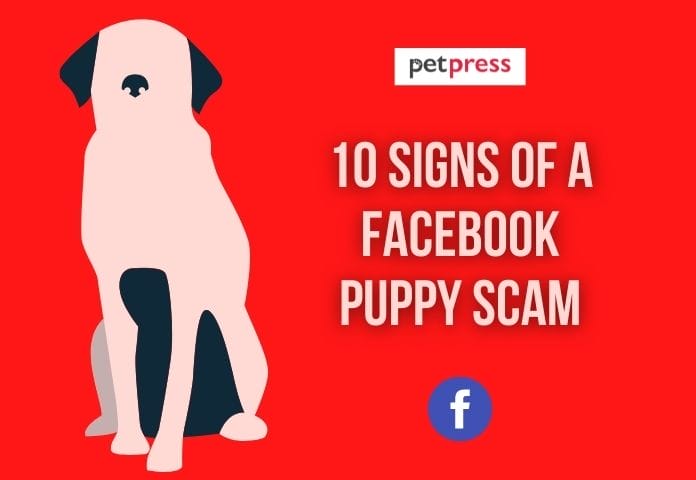
The Better Business Bureau (BBB) did a study on Craigslist puppy frauds (and other similar internet sales of dogs). Eventually, we found that 12.5 percent of all reported online purchase fraud was associated with puppy sale scams, with tens of thousands of claims being filed.
What Facebook puppy scam post may look like
To give you an idea, here is what a scam looks like on Facebook.


It can show as a listing (items for sale), post and comments on private or public dog groups, and especially as an ad.
Sadly, some dog lovers and prospective puppy buyers still find these as legitimate types of posts.
10 signs of a Facebook scam that you should look out for when planning to buy a pet
1. No other means of contact than Facebook
Fraudsters posing as real people in their profile advertise a sale of a dog for whom they “wish to find a new home.” However, it’s sketchy how these fraudsters only allow communicating via Facebook/Messenger chat.
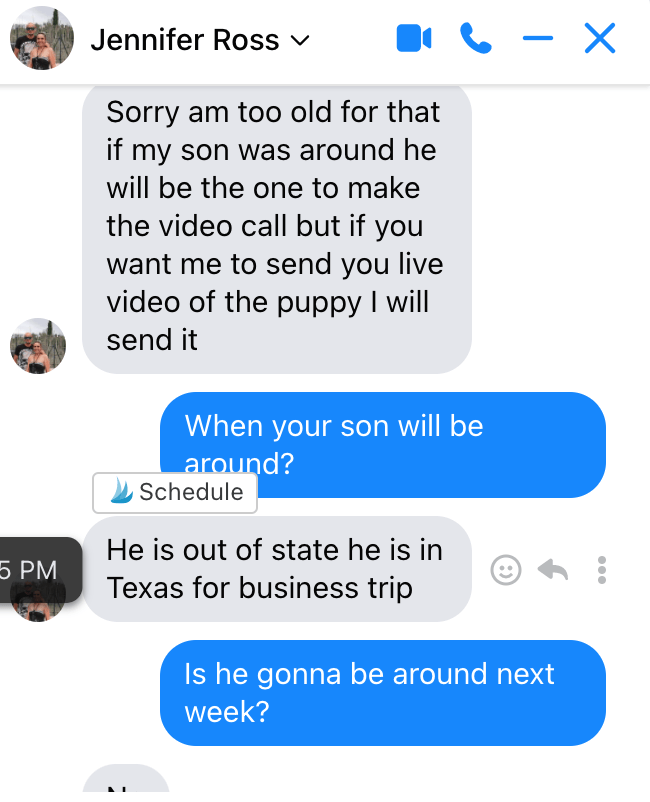
They don’t even allow phone or video calls and other means of online communication as they also have a reason. However, some fraudsters are willing to communicate via Whatsapp and ask for your contact information which makes the transaction riskier.
2. No PayPal or another form of payment with tracking capabilities
They may ask you for a wire transfer or leave their contact information on outside sites like Craigslist. If it seems too good to be true, then the chances of getting scammed are more likely than not.
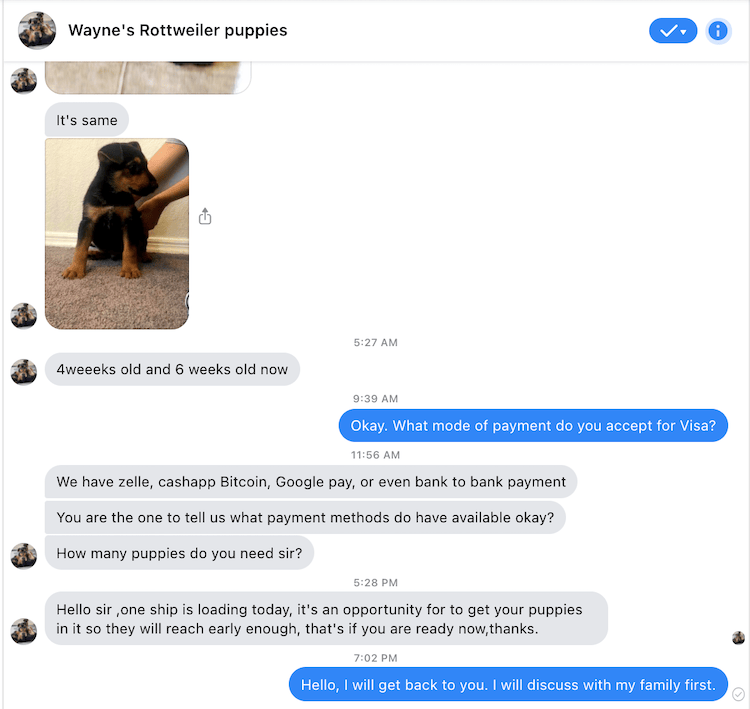
They also sometimes accept PayPal, but it should be listed as “friends or family” so they can’t be charged upon withdrawing.
- Related article: 5 Tips On Best Ways to Pay for a Puppy online With Credit Cards
3. Observe the seller’s post and page
A purebred dog costs between $5,000 and $7,000 at a reputable breeder, but several ads or a fake breeder’s Facebook page can sell the same dog for only $500! Avoiding a face-to-face meeting is also a valid reason which sellers use when posting.

If you see claims that the dog is still breed-worthy for future pups on a page or website, there’s a high possibility you’re looking at a dog selling scam. Also, look for the number of followers and reviews on their page to determine if they are real or not.
4. The dog is free until you pay for shipping
After you wire them money to ship the dog, they will tell you that it costs more than discussed. This is a common technique when importing dogs. Some sellers claim they want to rehome the dog, and all you have to do now is pay for the shipping fees.
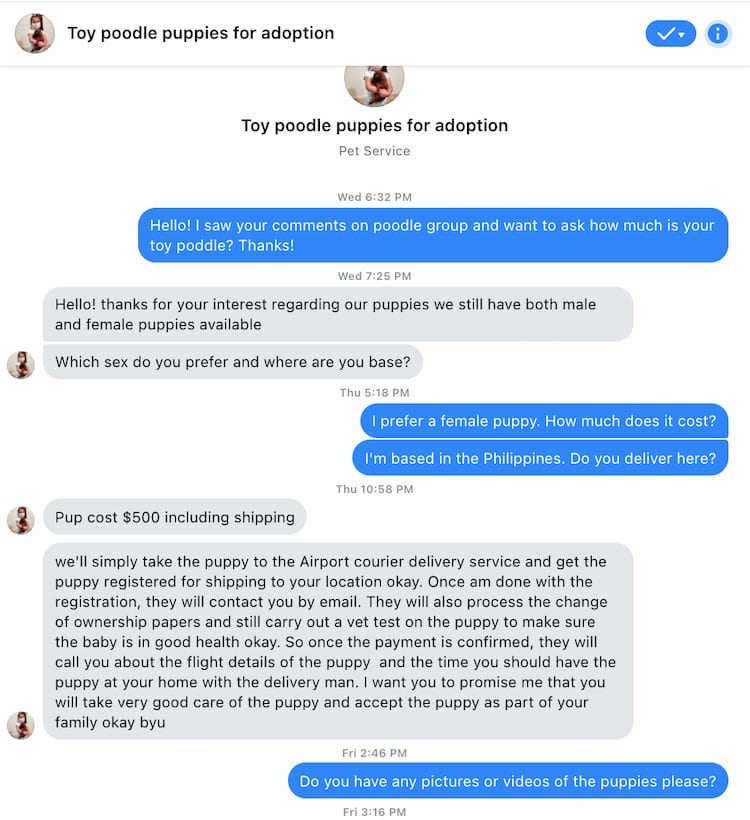
You’ll have to wire them money through Western Union or MoneyGram (or use a prepaid debit card) to secure the dog. Unfortunately, you cannot trace such money wires. They’ll also keep pestering you with higher prices for quicker and safer shipping.
5. No refunds or return accepted
Reputable breeders always prioritize the health of the puppies they are selling. Fake puppy scams happen in the UK, where they give a sick dog and even a different breed compared to the ones they post. Watch out for the information and documents they send in chats and ask precisely about it without hesitation to avoid this scam.
A fake breeder will not allow refunds, but it’s easy for them to falsify dog information and documents.
6. Other fees are charged after the deposit
With a reputable breeder, the price you are quoted will be guaranteed. Any “extras” specified before the deposit should be written and understood by both parties.

Scammers usually add extra fees like crate fees up to $800, travel insurance for $1,000, increased shipping costs, and airport-to-door delivery. Keep in mind that airports require live animals to be picked up on-site with the proper documentation.
7. Don’t get compelled by false stories
It is expected that they dramatize a post upon selling a puppy. The tale of why a person is selling or re-homing their puppy grows more intriguing and sad as it progresses.

Stories include a death in the family, loss of a job, or moving to a place that doesn’t take pets. This is true in some cases, but you should be cautious unless you have a method of validating it.
8. Fast transactions and shipping
In this chat, the seller seems to be aggressive with the shipping date and pressures the customer to decide fast.
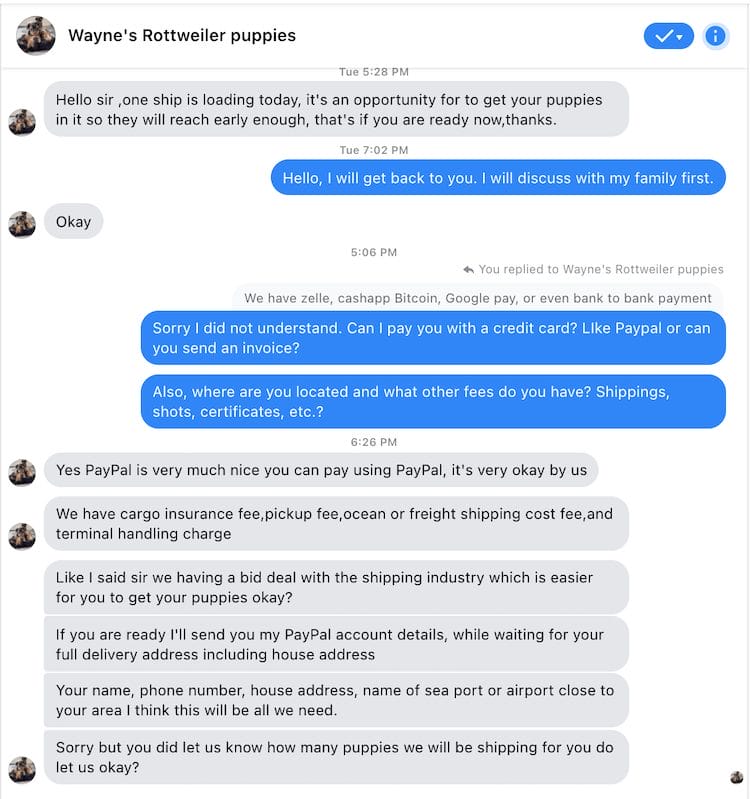
They also mention that they have contacts with the shipping industry. This is not true as shipping usually needs a 3-5 day process before transporting a dog.
9. Refund Upon Receipt
The seller might also promise a refund of insurance or shipping charges when the dog is delivered safely. This is a bait-hooked line, which makes you feel more secure when paying additional costs.
Scammers may also threaten you by claiming that missing out on higher fees might result in your chosen puppy being forfeited.
Even worse – they can claim to report you to the FBI for animal cruelty because the dog is in danger. None of these can be done, and it is better to report these puppy scammers first.
10. Photos that are re-used
One of the simplest ways to detect puppy scams is to check for previous postings of the seller’s photographs on other websites.

The most common tactic used by internet scammers is to use photographs of real pups from other advertising or Facebook postings. You can utilize Google’s reverse image search to see whether that photo has previously been submitted on the web.
- Related article: How To Track Down Pet Scammers Before You Buy A Pet?
CONCLUSION
These red flags are the common ways to spot a Facebook puppy scam. Beware of these methods and always look at how they communicate. Most scammers communicate with improper English as they can be people in another country posing as Westerners.
If ever you suspect a Facebook puppy scam, you may report them to the following:
- BBB’s Scam Tracker
- Report A Scam At PetPress
- Federal Trade Commission (or call 1-877-FTC-HELP)
- State Attorney General
- Does Cat Litter Melt Ice? The Complete Guide to Winter Safety - January 30, 2026
- Happy Tail Dogs: Understanding This Common Canine Condition - January 29, 2026
- How Cold Can Outdoor Cats Handle? Feline Winter Safety - January 27, 2026

